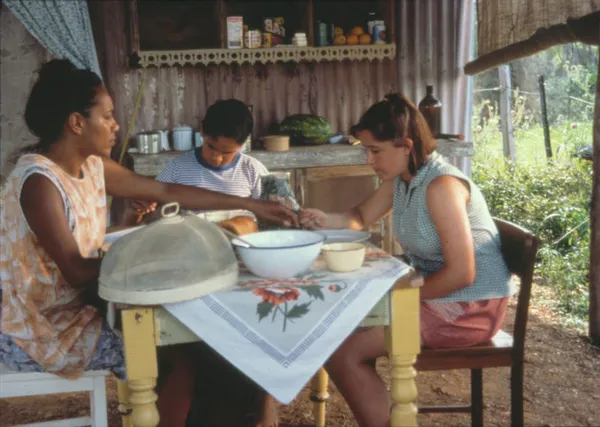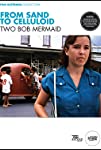Eye For Film >> Movies >> Two Bob Mermaid (1996) Film Review
Two Bob Mermaid
Reviewed by: Andrew Robertson

Australia, 1957. Esther William's turn as Australian swimming legend Annette Kellerman has made it out here to the segregated suburbs. From polio to the pool, Kellerman is a foundational figure in synchronised swimming. Her musical biopic Million Dollar Mermaid is the inspiration for the title. Even adjusting for inflation there's some disparity.
Two Bob Mermaid was Darlene Johnson's debut short. Carrie Prosser, who plays protagonist Koorine, and Tessa Leahy, who plays her mother, were similarly new. The story is a simple one, but bound up in the Australian aboriginal experience. In a film that's not shy in its depiction of racist language and attitudes, the consequences of Koorine's ability to pass as white are explored.

This is uncomfortable viewing. Not just because of the language, nor the era. That 1957 is only slightly more than half again as far as 1996 is from today is a different kind of discomfort. There are artifacts of age, viewed on Vimeo there's a suspicion that not all the distortions of sound are intentional. Certainly the heavy echo of a ball bouncing towards the fence, weighty with the separation between those of the swimming pool and those of the swimming hole.
Moving between these two worlds is Koorine. She is Koori, indigenous of a region colonised as New South Wales and Victoria. There's a conversation with her mother about the the fact that she's kept that she's a 'blackfella' from her new friends at the pool. There are other, starker contrasts. As with other outposts of Australian cinema anthropogenic lines mark landscapes psychic and physical. Here not the infinite stretch of the horizon and railway line of Wake In Fright but the demarcation between black paving and tan earth. The fence between the public pool and those not permitted to use it. Wriggly tin and laundry, shadows and lanterns to cast them.
Shot on film in an aspect ratio that now seems doubly dated there are elements of period piece. There's an old truck, the artifacts of a milk bar, the rust of one and the polished steel of the other another in a set of contrasts. Koorine's ability to pass into the realm of the pool does not make it easier for her to stray from her lane.
There's mentions of other escapes, options. The ringing tune of an untuned fork, the bottle that brings the big rock candy mountain. There are times when it feels it may verge on the heavy handed, but in truth that's an artifact of distance. There are subtleties here, not least in the ending. Details are small but well scattered, each adding to the tale.
With music by The Tiddas, named for the Koori word for 'sisters', this is a film whose importance and quality was recognised at the time. Shortlisted for a Baby Lion at Venice, and the first indigenous Australian film to screen there, it won subsequent awards. Johnson hails from Belbrook, New South Wales, and is a Dunghutti. Two Bob Mermaid drew from her mother's experiences in an era of Australian history whose repercussions are still felt today, though much of her subsequent work has been documentary. Assisted by a scheme to improve access to directing roles in television, some 20 years after this film she helmed episodes of Oz-soap stalwarts Home & Away and then Neighbours.
That's not to denigrate either - work that pays is still work. It speaks though to the issues affecting both indigenous and Australian film. Work of quality is drowned out by import. The processes by which films escape domestic markets or are sanitised for international ones can wash away the things that make them special. That's not true of Two Bob Mermaid. Not quite a 'coming of age' story about a teenage girl, nor about the conflict between the Australias. Like its title it's of two worlds, referencing another, and all the stronger for it.
Reviewed on: 16 Apr 2021
















